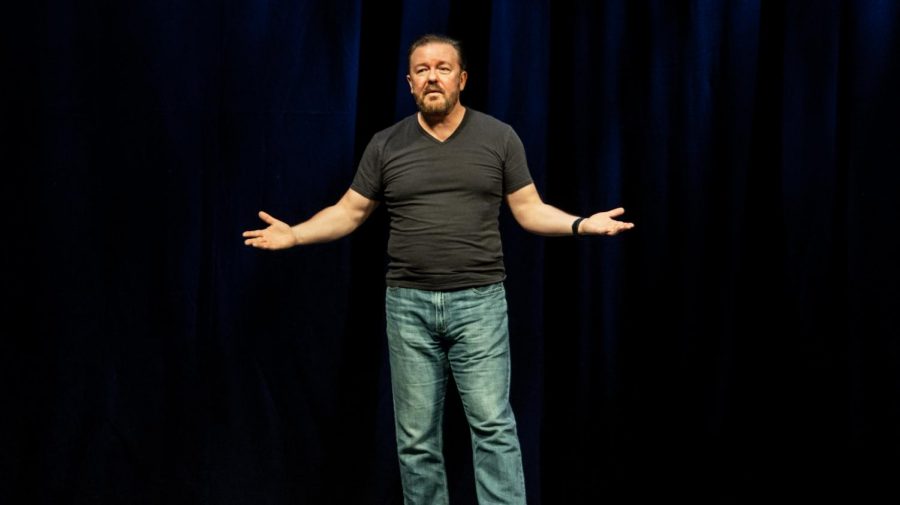Ricky Gervais is Wrong to Wish for the Silence of Celebrities
RAPH PH VIA FLICKR
Ricky Gervais charged celebrities at the Golden Globes with hypocrisy. But promoting apathy is far worse.
January 22, 2020
Ricky Gervais, comedian and host of this year’s Golden Globes, used his opening monologue earlier this month to take a jab at celebrities who advocate for political change in their speeches. He explained that the celebrities at the show profit off companies in the industry that cause harm, saying they are “in no position” to advocate for change because of this, even joking that they would work for ISIS if it started a streaming service.
First and foremost, by calling for silence on important issues facing the United States and the world at large, Ricky Gervais failed his own request to keep politics out of the Golden Globes. Shutting down advocacy is an action in favor of the status quo, just as much of a political stance as any other.
There’s a broader discussion to be had over Gervais’ use of the trope of “Hollywood elites.” A common attack against celebrities when they advocate for, say, environmental policy, is that their actions contribute the most to climate change and that they are hypocritical for advocating for green causes. Silencing celebrities due to this hypocrisy, while valid, is not productive.
Take individuals such as Leonardo DiCaprio or Colin Kaepernick. Although they could be critiqued for hypocrisy, their contributions to different progressive organizations have a much larger impact on the political landscape than the actions of average people.
Leonardo DiCaprio may take private jets and contribute to the carbon dioxide in the atmosphere more than the average person, but he also does far more to advocate against climate change than most. Even calling for action in favor of systemic change in speeches can be a valuable form of social justice work. In 2016, when Leonardo DiCaprio gave a speech following his acceptance of an Oscar for Best Actor, he called for world leaders to rein in large corporations responsible for climate change.
By using Google search data and Twitter searches, researchers from San Diego State University were able to find that DiCaprio’s speech to 34.4 million viewers generated more conversation with the terms “climate change” and “global warming” than the Paris Climate Accord negotiations and Earth Day combined. This makes DiCaprio’s public support of environmentalism incredibly valuable, regardless of whether he is “hypocritical.” To this end, celebrities viewed positively by the public have been shown to increase support for the political movements they support publically.
Further, DiCaprio regularly contributes to green causes. Recently, his environmental association called Earth Alliance announced it would work to donate $3 million to organizations in Australia dealing with the consequences of the Australian wildfires. Would the world be better or worse off if DiCaprio restrained himself from engaging with political issues?
Taking Gervais’ argument, Colin Kaepernick should also be silenced for hypocrisy by drawing his wealth and visibility from the NFL. Kaepernick advocates against racial injustice in the United States, but the NFL, from which he drew his wealth, has its own issues with race. For example, the Rooney Rule put in place by the NFL in 2003 called for teams to give opportunities to minorities to interview for coaching positions. Yet even this year, out of the five head coach positions made available, only one went to a Latino man, Ron Rivera, while no black candidates have been hired.
The Rooney Rule has proven ineffective at adequately increasing black representation in head coaching positions with only three of the 32 teams in the league having black coaches, despite nearly 70% of players in the league being black. Knowing this, should Kaepernick hold himself back from advocating for racial justice on account of receiving his fame and wealth from the NFL?
I don’t think so. Kaepernick’s kneeling protest raised significant awareness for issues affecting black Americans. He furthered the conversation regarding the unequal treatment of black Americans by police and the importance of groups such as Black Lives Matter. From 2016 to 2017, the period in which his protest was at its highest point of controversy, he donated a total of $1 million across different organizations working for racial and gender equality.
Those who care about issues like climate change should be wary of taking statements like Gervais’ too seriously and come to a more nuanced understanding of the role celebrities can play in advocating for change. Rather than shutting out celebrities who live in and benefit from systems that counter progressive goals for hypocrisy, we should view their efforts positively. Shutting celebrities out only acts counter to progressive goals.
Further, most of us support Fordham College at Lincoln Center financially in some way. Our school is also the beneficiary of land received through the displacement of thousands of poor, mostly Puerto Rican families. Would it then be wrong for us to engage with important political issues of the day involving the plight of lower-income Americans and minorities? I would hope Fordham students would be willing to engage in social justice despite benefiting from the wrongs done throughout our school’s history.












jackie • Jul 9, 2020 at 5:15 am
finally someone said it! thank you!